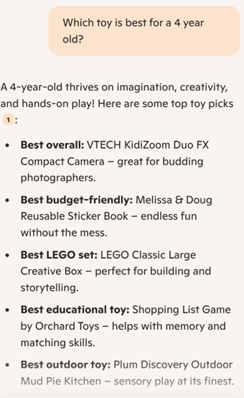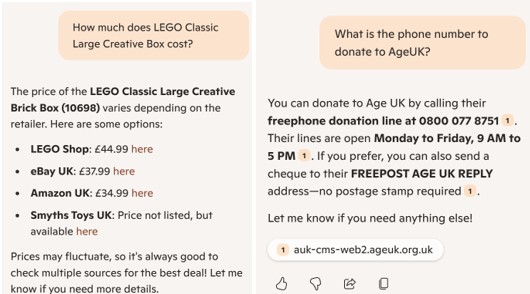Does ChatGPT recommend your brand? If not, what are you doing about it?
Users increasingly rely on their favourite AIs for product recommendations, doing brand research, getting ideas for their next hobby and so on – essentially, anything they may have previously used classic search engines for.
So why does this matter?
Well in short, if the reply from your phone, or your ChatGPT prompt has sufficient information, then the users have no incentive to go and visit your brand’s website; or put differently- your website no longer influences the purchasing journey directly!

Fig: Example asking CoPilot for toy recommendation.
The problem
While you will be happy if the AI lists your product or service, you may still be concerned about things like:
- Why was my brand listed as second and not first?
- Where did the details about my products derive from?
- What if the details are not correct? How can I update them?
- How do I cross-sell / up-sell if I do not control the user journey?
Another issue is that AI responses may be based on data that is not 100% up to date, and you may have had a product recall, a special stock clearance offer, or what if your charity has a new donation phone number?

Fig Examples: Is the pricing information up to date, and is the phone number correct?
Of course, with the regular search engines, you’d be able to log in to your account, change the priority of information / how your search equity is managed, or make forced updates. But with this information potentially being based on data you do not control, how can you ensure its correct, or, as the second example shows, that it is taken from the correct/official environment?
Secondary problem
Marketers in the digital space rely on being able to evaluate where efforts and budgets are best spent. We’re very used to classic conversion rates and KPIs such as website traffic numbers, time on site, bounce rates, etc., and this all ties into our SEO strategies and efforts around designing engaging user journeys.
However, in the best-case scenario, if AI is promoting our brand efficiently, we could see sales increase, while, for example, our website traffic is declining. While increased sales are great, does our reporting consider our inability to see how the journey converted, or is this now skewing our analytics?
Of course, it is much worse if AI is not promoting our brand and we're not in the mix every time someone asks their phone for a recommendation.
What to do about it?
Our research shows that, while the approach for ensuring your brand ranks highly with the leading AI engines, in some ways, is similar to good practice SEO, there is more to it. PPC and other paid for promotions are generally observed, but not all from the same places, e.g. Google etc. and, not only do you need to have your data presented in a way that lets the AI easily consume the information, there is an increased need for also thinking about how it is inter linked and how you keep it up to date. This goes back to the way, for example ChatGPT, breaks up what you put into the prompt. To me it’s a bit like reverse engineering a paragraph in a language you don’t speak. You could translate sentences, or even the words one by one, to then be able to deduce what the paragraph is likely about or at least have a couple of ideas of what the paragraph is about. ChatGPT to some degree does the same, and once it has its query candidates, it can execute them to get different results. All these queries we can see by looking at what ChatGPT does using standard dev tools.
This then leads us back to our classic SEO work, where now that we know what ChatGPT actually searched for, we can optimize our sites to ensure we rank top on those searches.
Of course, the real change is in the change to user behavior - if the user sees your carefully designed ‘journey to convert’ as simply ‘noise’ on their road to buy or get what they want, then this will be your starting point for optimizing.
Additionally, our research shows that ‘influencers’- not just your vlogger or TikTok celebrity but recognized bodies like established specialist forums, news outlets, etc.- are highly weighted in many cases, something you certainly should not ignore.
Final thoughts
Before scrapping all your carefully designed user journeys, I’d recommend thinking of this as a new journey type you need to support. A bit like a decade+ ago, when concepts such as mobile-first became mainstream, we are now firmly in an AI-first scenario where, while a mobile is likely to be the device used, the initial touch base for your brands with the users is driven by AI.
If you’d like to know more about our research into getting brands recognized and prioritized on the mainstream AI engines (ChatGPT, CoPilot and Gemini), please connect on LinkedIn or send me an email.
At the time of writing, ChatGPT is down globally. Now, that is food for thought: "What might users do in that case? Could it reflect badly on your brand if the service is down?”

